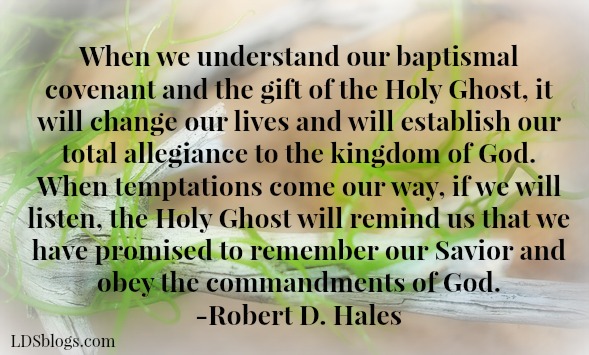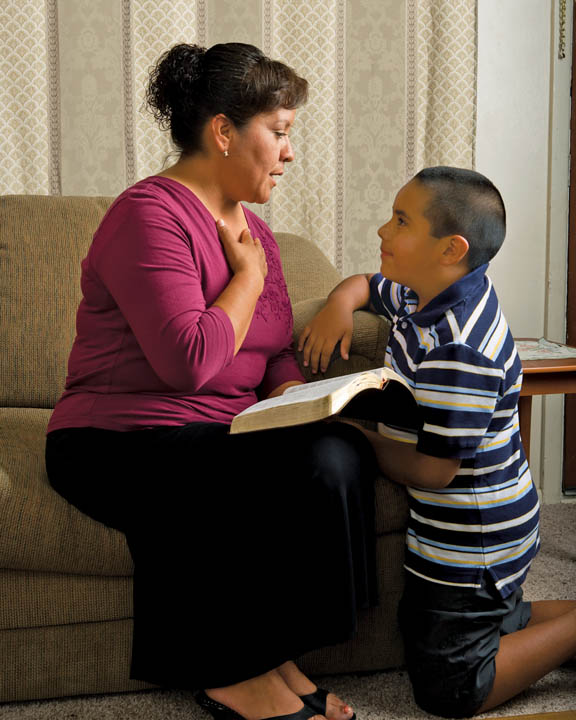Mormons (a nickname for members of The Church of Jesus Christ of Latter-day Saints) can be baptized at the age of eight years old. The children I teach at church will all, with the exception of one younger child, be enjoying that privilege this year, and we will be spending time preparing them for that special moment in their lives. However, some friends of other faiths insist to me that children are too young to understand baptism. Others think they should have been baptized at birth. Before I explain how we prepare our children for baptism, let me explain why we don’t do it sooner.
Why Mormons Wait for Age 8 to Baptize
Mormons believe that baptism should be a choice, even for children. They need to be old enough to have at least a basic understanding of gospel principles and know how to pray to be sure this is what God wants them to do.
Mormons believe that children younger than age eight cannot sin, because they aren’t old enough to really make choices. They often don’t know right from wrong, and they need time to learn and to practice being good Christians. Children who die younger than age eight return directly to Heavenly Father’s presence, regardless of how they lived their lives on earth or what religion, if any, they belonged to. They are not accountable for their choices.
During those seven years, their parents are responsible for teaching them right from wrong and helping them learn how to make good choices. Their church teachers and leaders help. Following is an explanation of some of the ways Mormons help their children prepare to be baptized on or near their eighth birthdays.
Learning Mormonism at Home
Mormon parents believe that preparing their children for baptism and teaching them to be good Christians is the responsibility of the parents. The Church’s role is to help the parents.
They begin by setting a good example for their children. They try their best to live their faith so their children can see what they do and try to emulate it. They know their children learn best simply by watching their own parents and that children often want to be like their parents.
These parents also establish good habits for their family. The Church has introduced a range of programs parents can introduce into their homes to help with that process.
Family Home Evening
 One evening a week, usually Mondays, Mormon families gather together to learn their faith in the home. They choose their own lessons, based on what they feel their family needs to know. They can use church resources or create their own materials.
One evening a week, usually Mondays, Mormon families gather together to learn their faith in the home. They choose their own lessons, based on what they feel their family needs to know. They can use church resources or create their own materials.
The meetings usually follow a standard procedure, but family members take turns carrying out each duty, so even little children learn how to lead music or conduct a meeting. Young children often even teach the lessons with the help of an older family member.
Most meetings begin with a hymn and family prayer. Following this, they may carry out family business as needed before going on to their lesson for the week. This is sometimes done after the lesson. Many families play games together for a while following the serious parts of the evening and then enjoy a treat. The evening is a wonderful way for busy families to make sure they reserve some memorable quality time together.
Family Prayers
Mormon families try to hold family prayer at least twice a day, mornings and evenings, as well as at shared meal times. This lets the parents model an appropriate prayer—given from the heart, not from recited pieces—and allows parents to teach children that prayer is a way to communicate with God when the family faces challenges or is joyful.
Personal Prayers
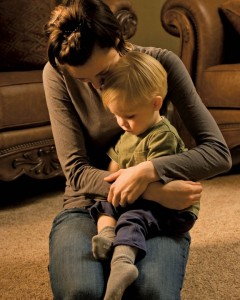 As soon as Mormon children can repeat prayers, their parents teach them how to say their own personal prayers. At first, they may only repeat the words their parents tell them to say, but before long they are holding their own conversations with God twice a day or more often. They learn how to build a very personal relationship with God, discussing their own thoughts and sharing their lives with Him.
As soon as Mormon children can repeat prayers, their parents teach them how to say their own personal prayers. At first, they may only repeat the words their parents tell them to say, but before long they are holding their own conversations with God twice a day or more often. They learn how to build a very personal relationship with God, discussing their own thoughts and sharing their lives with Him.
Choosing and Honoring Values
Parents help children learn what God and Jesus Christ want us to do. They help their children learn how to set priorities and how to make moral decisions that come about in their lives. They demonstrate this through their own lives, and when the children encounter an issue, they help the children learn how to make their own decisions about handling the challenges.
Children can often make wise moral choices at an early age, and Mormon parents have faith in their children. They encourage children to be worthy of what their parents know they can learn to do. Often, as I teach children at church, even the very young ones will share experiences in which they encountered moral decisions and chose the Christ-like path for themselves.
When children make mistakes, parents teach their children how to repent and to make changes for the future. Although God does not hold little children accountable for their mistakes, they do need to learn what to do when they make one and this time allows them to practice the proper procedures and also to fill their hearts with a love for following Jesus Christ and a sadness for mistakes.
Learning at Church
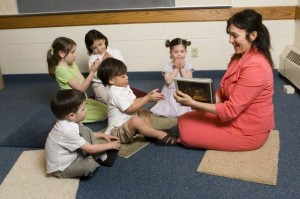 At church, children begin to attend classes at age eighteen months. They begin by attending a nursery where they play with toys, learn church songs, have a snack, and enjoy a simple and brief lesson. These lessons bring the gospel to the very simplest level and is taught through pictures and simple activities.
At church, children begin to attend classes at age eighteen months. They begin by attending a nursery where they play with toys, learn church songs, have a snack, and enjoy a simple and brief lesson. These lessons bring the gospel to the very simplest level and is taught through pictures and simple activities.
When they are three, they begin to attend regular classes. The first classes are fairly basic, but they gradually move up in complexity and many adults, reading the manuals for children who have been baptized, are surprised at just how much those children are learning. Even when I taught little children, I was at first surprised at how much young children are taught and how eager they are to learn it. I’ve learned not to water down the lessons we’re asked to teach. They understand much more than I once gave them credit for.
Read the actual lessons taught to Mormon children at Church.
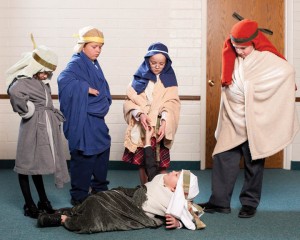 The children I am teaching this year just completed an entire year on the life of Jesus Christ, as taught in the New Testament of the Bible. This year, they will be studying the Book of Mormon, which also includes many lessons on Jesus Christ and His teachings. They will mingle learning the stories with learning how Jesus Christ wants them to live their lives. They will also study basic Mormon beliefs, preparing them for their baptisms as they turn eight throughout the year.
The children I am teaching this year just completed an entire year on the life of Jesus Christ, as taught in the New Testament of the Bible. This year, they will be studying the Book of Mormon, which also includes many lessons on Jesus Christ and His teachings. They will mingle learning the stories with learning how Jesus Christ wants them to live their lives. They will also study basic Mormon beliefs, preparing them for their baptisms as they turn eight throughout the year.
My students are ready for baptism. As I’ve taught them for the past several months, I’ve been impressed that they have not just memorized a lot of information. They think deeply and some of the discussions that arise in our class would stump adults. One child will ask a deep question and other
children will offer powerful thoughts on the topic. They care about their Savior and they want to understand—really understand—what He wants them to know. Their love for Him is very deep and they demonstrate that they have spent a great deal of private time thinking about their faith.
They are ready—even more ready than I was as a teenaged convert—for their baptisms. They have learned what they are agreeing to at their baptisms and have made personal commitments to live as Jesus wants them to live. When they meet with their bishop (pastor) to share their testimonies and their desire for baptism, they will be ready to commit to an eternal life with their Savior and with their God.
About Terrie Lynn Bittner
The late Terrie Lynn Bittner—beloved wife, mother, grandmother, and friend—was the author of two homeschooling books and numerous articles, including several that appeared in Latter-day Saint magazines. She became a member of the Church at the age of 17 and began sharing her faith online in 1992.

